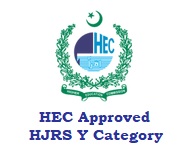How important is Efficiency in any Organization? “Estimating the Efficiency Reform of Power Distribution Companies in Punjab Province, Pakistan” (LESCO, FESCO & IESCO)
Keywords:
Calculating the Efficiency, Reform of Power Distribution CompaniesAbstract
In 1998, Pakistan took the step of reforming its electrical market including Punjab Province. In the same year, the WAPDA Act was established to maximize the whole well-being of the economy and adequately satisfy the country's growing energy requirements. The main goals of the reforms were to achieve operational, financial, and managerial efficiencies by reducing power prices, gross margins, system losses, and infrastructure spending. It was to be accomplished by raising private sector investment in electricity generation to utilize available generation capacity better and improve distribution utilities' efficiency. Additionally, the reforms aimed to enhance the distribution utilities' efficiency. These requirements are satisfied by the rapid development of the expansion of grids and the progression of technology. Currently, this study is focused on LESCO, FESCO, and IESCO distribution network input and output characteristics relative to their efficiencies and improving their economic and social impacts on Pakistan. The Data Envelopment Analysis is applied. Then, the results indicate that IESCO appears to be on an upward trend, FESCO likewise appears to be on an upward trend, and LESCO appears to be on a downward trend from the previous year into the future years.
Downloads
References
Afza, T., & Asghar, M. J. A. (2012). "Financial reforms and efficiency in the insurance companies of Pakistan. African Journal of Business Management", 6(30), 8957-8963. https://doi.org/10.5897/AJBMl 1.1821
Aziz, R., & Ahmad, M. B. (2015). Pakistan’s power crisis. Special report. United States Institute of Peace. https://www.usip.org/sites/default/files/SR375-Pakistans-Power-Crisis-The-Way-Forward.pdf .
Bacon, R., & Besant-Jones, J. (2001). Global electric power reform, privatization, and liberalization of the electric power industry in developing countries. Annual review of energy and the environment, 26(1), 331-359.
Coelli, T. and S. Perelman (2020). Technical efficiency of European railways: a distance function approach. Applied Economics, 32(15): p. 1967-1976.
Jaraite-Kazukauske, Jurate & Di Maria, Corrado. (2010). Efficiency, Productivity and Environmental Policy: A Case Study of Power Generation in the EU. Energy Economics. 34. 10.2139/ssrn.1718358.
Malik, A. (2012). Power crisis in Pakistan: a crisis in governance? (No. 2012: 1). Pakistan Institute of Development Economics.
Mushtaq, N & Saddique,F, Efficiency of Power Distribution Companies in Pakistan (Application of Non Parametric Approach): International Journal of Disaster Recovery and Business Continuity Vol.12, No.1, (2021),pp. 1721-1734.
Mushtaq, N., Badar, M., Akhtar, F., Batool, F., Sandhu, M. E., Khan, M. I., ... & Zia, M. A. (2021). Efficiency of Power Distribution Companies in Pakistan (Application of Non Parametric Approach).
Nawaz, S. M. N., & Alvi, S. (2021). Energy security for socio-economic and environmental sustainability in Pakistan. Heliyon, 4(10), e00854.
Nepal, R., & Jamasb, T. (2020). Reforming small electricity systems under political instability: The case of Nepal. Energy Policy, 40, 242-251.
Nepal, R., Carvalho, A., & Foster, J. (2020). Revisiting electricity liberalization and quality of service: empirical evidence from New Zealand. Applied Economics, 48(25), 2309- 2320.
NEPRA (2021). State of Industry report. Islamabad, Pakistan: Ministry of water and power development authority. Retrieved from: http://www.nepra.org.pk
Qazi, U., & Jahanzaib, M. (2018). An integrated sectoral framework for the development of sustainable power sector in Pakistan. Energy Reports, 4, 376-392.
Qazi, U., Jahanzaib, M., Ahmad, W., & Hussain, S. (2017). An institutional framework for the development of sustainable and competitive power market in Pakistan. Renewable and Sustainable Energy Reviews, 70, 83-95.
Sultana, U., Khairuddin, A. B., Aman, M. M., Mokhtar, A. S., & Zareen, N. (2016). A review of optimum DG placement based on minimization of power losses and voltage stability enhancement of distribution system. Renewable and Sustainable Energy Reviews, 63, 363-378.
Ullah, K., Arentsen, M. J., & Lovett, J. C. (2021). Institutional determinants of power sector reform in Pakistan. Energy Policy, 102, 332-339.
Zameer, H., & Wang, Y. (2021). Energy production system optimization: Evidence from Pakistan. Renewable and Sustainable Energy Reviews, 82, 886-893.
Zhang, Y.-F., Parker, D., & Kirkpatrick, C. (2020). Electricity sector reform in developing countries: an econometric assessment of the effects of privatization, competition and regulation. Journal of Regulatory Economics, 33(2), 159-178.
Zhou, Peng & Ang, Beng & Poh, Kim. (2008). A survey of data envelopment analysis in energy and environmental study. European Journal of Operational Research. 189. 1-18. 10.1016/j.ejor.2007.04.042.
Downloads
Published
Issue
Section
Categories
License
Copyright (c) 2023 The Authors

This work is licensed under a Creative Commons Attribution-NonCommercial 4.0 International License.






